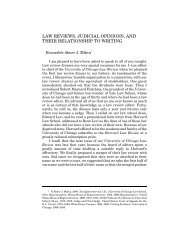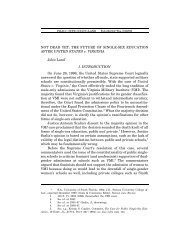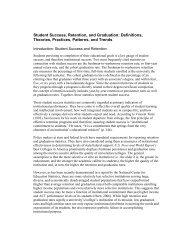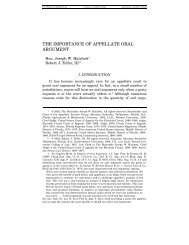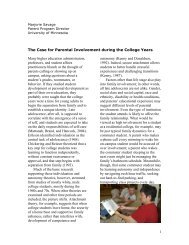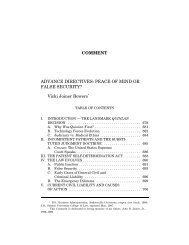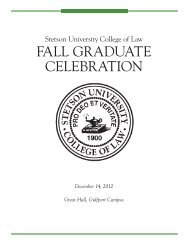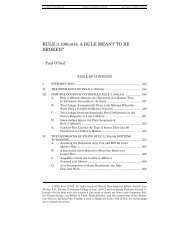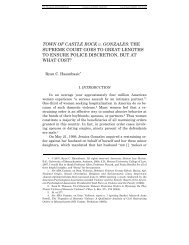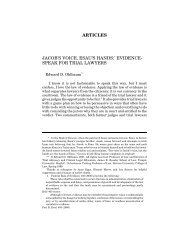File: Davis.343.GALLEY(7) Created on: 6/2/2005 9:33 AM Last Printed: 7/7/2005 2:54 PM762 <strong>Stetson</strong> Law Review [Vol. 34o<strong>the</strong>r jurisdictions and decided to allow <strong>post</strong>-<strong>penetration</strong> <strong>rape</strong> asan <strong>of</strong>fense because <strong>the</strong> Kansas statutes do not say that intercourseends with <strong>penetration</strong>. 222 Therefore, continued nonconsensualintercourse, coupled with <strong>the</strong> o<strong>the</strong>r elements <strong>of</strong> <strong>rape</strong>, met <strong>the</strong>elements <strong>of</strong> <strong>the</strong> <strong>rape</strong> statute. 223 Bunyard expanded <strong>the</strong> limitedprecedent <strong>of</strong> what constitutes a reasonable time for one partner todiscontinue intercourse after <strong>the</strong> o<strong>the</strong>r revokes consent by findingthat it was not reasonable for <strong>the</strong> defendant to take five to tenminutes to stop <strong>the</strong> intercourse. 224When <strong>the</strong> California Supreme Court decided In re John Z.,<strong>the</strong> impact <strong>of</strong> <strong>the</strong> holding on <strong>the</strong> nation was impossible to predict.225 An important breakthrough occurred in July 2003. In responseto John Z., <strong>the</strong> Illinois Legislature passed a revokedconsentstatute. 226 The statute provides, “A person who initially222. 75 P.3d at 755–756 (relying on <strong>the</strong> holdings in John Z., Robinson, and Siering, andrejecting <strong>the</strong> logic <strong>of</strong> Vela).223. Id. at 756.224. Id.225. E.g. Armond D. Budish, When a Woman Says No, <strong>the</strong> Man Had Better Stop, TheColumbus Dispatch 02F (Apr. 18, 2003) (noting that Ohio courts have not declared a positionon <strong>post</strong>-<strong>penetration</strong> <strong>rape</strong>, “[b]ut if men want to stay on <strong>the</strong> right side <strong>of</strong> <strong>the</strong> <strong>law</strong>, <strong>the</strong>ywould be wise to listen up and put on <strong>the</strong> brakes—immediately—when a partner makes itclear she wants to stop”); Family Violence Prevention Fund, supra n. 4 (stating “[i]t isunclear what impact, if any, <strong>the</strong> California Supreme Court’s ruling will have on cases ino<strong>the</strong>r states”).226. 720 Ill. Comp. Stat. Ann. 5/12-17 (West 2004). The Illinois statute’s opponentsargue that is unnecessary because it allows women to claim <strong>rape</strong> when <strong>the</strong>y actually engagedin consensual intercourse, it counteracts <strong>rape</strong> <strong>law</strong> reforms, and it confuses <strong>the</strong>meaning <strong>of</strong> consent. See Bean, supra n. 180 (stating that one “should [not] have to codifybasic principles <strong>of</strong> human rights, which is what <strong>rape</strong> <strong>law</strong>s are all about”). However, byreviewing <strong>the</strong> case <strong>law</strong> <strong>of</strong> <strong>post</strong>-<strong>penetration</strong> <strong>rape</strong>, it becomes clear that statutory changesare necessary to provide guidance to courts that are addressing <strong>the</strong> <strong>post</strong>-<strong>penetration</strong> <strong>rape</strong>scenario. Because <strong>of</strong> <strong>the</strong> initial consent, it is more burdensome to prove a revoked-consent<strong>rape</strong> case. Id. (noting that in a state without a revoked-consent statute, it is “difficult toconvict if <strong>the</strong> initial <strong>penetration</strong> is consensual”). A codification <strong>of</strong> <strong>the</strong> elements required toprove a <strong>post</strong>-<strong>penetration</strong> <strong>rape</strong> case will ease <strong>the</strong> burden on prosecutors and ensure thatdefendants who committed a deviant act will be punished. NBC News: Saturday Today,“Kobe Bryant Sexual Assault Charge” (NBC Aug. 2, 2003) (TV broadcast, transcr. availableat http://www.royblack.com/tv/transcripts/nbcnews_ aug2_03.html (accessed Sept. 29,2004)) [hereinafter NBC News] (stating that <strong>the</strong> Illinois statute will overcome that burdenbecause it is “going to be an additional tool for prosecutors to use in <strong>the</strong>ir closing argument”and for judges to use when instructing <strong>the</strong> jury as to “what constitutes consent,[and] <strong>the</strong>refore, what constitutes <strong>rape</strong>”). Concerns that a revoked-consent statute willcreate a slew <strong>of</strong> fraudulent or frivolous cases in which a woman will “utter a barely audibleno” during intercourse and <strong>the</strong>n claim <strong>rape</strong> are irrational. Greene, supra n. 4; see also NBCNews (stating that <strong>the</strong> Illinois revoked-consent statute “is going to encourage <strong>the</strong> falsereporting <strong>of</strong> <strong>rape</strong>, not real instances <strong>of</strong> <strong>rape</strong>”). False reports <strong>of</strong> <strong>rape</strong> are no more prevalent
File: Davis.343.GALLEY(7) Created on: 6/2/2005 9:33 AM Last Printed: 7/7/2005 2:54 PM2005] Post-<strong>penetration</strong> Rape 763consents to sexual <strong>penetration</strong> or sexual conduct is not deemed tohave consented to any sexual <strong>penetration</strong> or sexual conduct thatoccurs after he or she withdraws consent during <strong>the</strong> course <strong>of</strong> thatsexual <strong>penetration</strong> or sexual conduct.” 227 It is <strong>the</strong> first revokedconsent<strong>law</strong> in <strong>the</strong> United States and was passed for several reasons.First, <strong>the</strong> Illinois Legislature wanted to avoid a lengthycourt battle like that <strong>of</strong> John Z. if a <strong>post</strong>-<strong>penetration</strong> <strong>rape</strong> casewas prosecuted in Illinois courts. 228 Second, <strong>the</strong> <strong>law</strong> was intendedto redefine consent by codifying <strong>the</strong> idea that a person may haltsexual activity at any time. 229than false reports <strong>of</strong> o<strong>the</strong>r serious crimes. Burt, supra n. 154, at 28. The same concernswere articulated by those “opposed to abolishing <strong>the</strong> marital <strong>rape</strong> exemption”—that vindictivewives would bring false <strong>law</strong>suits. Allison & Wrightsman, supra n. 20, at 91. Eliminating<strong>the</strong> marital <strong>rape</strong> exemption did not create a flood <strong>of</strong> matrimonial <strong>rape</strong> claims. Id. Similarto <strong>the</strong> increasing acceptability <strong>of</strong> acquaintance-<strong>rape</strong> claims, a revoked-consent statutewill empower <strong>the</strong> <strong>post</strong>-<strong>penetration</strong> <strong>rape</strong> victim to come forward with greater confidencethat <strong>the</strong> <strong>law</strong> protects <strong>the</strong> victims <strong>of</strong> crimes as well as <strong>the</strong> defendants who perpetratecrimes. Because so many acquaintance <strong>rape</strong>s go unreported, a codification <strong>of</strong> <strong>the</strong> principlethat a person may revoke consent may empower some victims to go forward with a <strong>rape</strong>claim. One study found that only five percent <strong>of</strong> acquaintance-<strong>rape</strong> victims reported <strong>the</strong>assault. Id. at 61.A revoked-consent <strong>law</strong> does not counteract <strong>rape</strong> <strong>law</strong> reforms. Although <strong>rape</strong> reformresulted in courts taking <strong>the</strong> focus <strong>of</strong>f <strong>of</strong> <strong>the</strong> victim’s conduct to a heavier examination <strong>of</strong><strong>the</strong> defendant’s conduct, <strong>the</strong> victim’s actions are a necessary inquiry in a <strong>post</strong>-<strong>penetration</strong><strong>rape</strong> case. A victim’s-rights advocate stated that <strong>the</strong> Illinois <strong>law</strong> thwarts <strong>rape</strong> <strong>law</strong> reformbecause it should never be codified that a woman can change her mind. Bean, supra n.180. However, o<strong>the</strong>r areas <strong>of</strong> <strong>law</strong> codify a person’s right to change his or her mind regardingconsent. Trespass <strong>law</strong> is illustrative <strong>of</strong> why a revoked-consent statute can apply in <strong>the</strong>arena <strong>of</strong> <strong>rape</strong> <strong>law</strong>. If you invite a person to come to your home and he or she gets rowdyand unpleasant, you have <strong>the</strong> right to revoke your consent to have that person in yourhome. If <strong>the</strong> <strong>of</strong>fending person remains, <strong>the</strong> person may commit a trespass. Similarly, if oneconsents to sexual intercourse, and <strong>the</strong>n revokes consent, <strong>the</strong> <strong>of</strong>fending person may stillcommit a <strong>rape</strong>.Finally, <strong>the</strong> Illinois statute does not confuse what constitutes consent. Ra<strong>the</strong>r, <strong>the</strong>statute clarifies <strong>the</strong> meaning <strong>of</strong> consent by providing that if a person initially consents tosexual activity, consent may not be presumed for any subsequent activity after withdrawal<strong>of</strong> consent. 720 Ill. Comp. Stat. Ann. 5/12-17 (West 2004). In effect, <strong>the</strong> statute negates <strong>the</strong>waiver approach to consent and protects <strong>the</strong> right <strong>of</strong> sexual autonomy. Fur<strong>the</strong>r, <strong>the</strong> statuteprevents confusion in <strong>the</strong> courtroom that has occurred in past <strong>post</strong>-<strong>penetration</strong> <strong>rape</strong> cases.Because <strong>the</strong> statute clearly allows people to withdraw consent, <strong>the</strong> likelihood <strong>of</strong> jury questionsis significantly decreased.227. 720 Ill. Comp. Stat. Ann. 5/12-17 (West 2004).228. See NBC News, supra n. 226 (describing Illinois’s reaction to John Z as “a clarificationto what constitutes consent”).229. See NBC News, supra n. 226 (emphasizing <strong>the</strong> fact that, under Illinois <strong>law</strong>, “consentis a freely-given agreement to <strong>the</strong> act <strong>of</strong> sexual <strong>penetration</strong> or sexual contact in question”and describing <strong>the</strong> <strong>law</strong> under <strong>the</strong> new statute as providing that “any time during thatsexual activity <strong>the</strong> person withdraws consent and <strong>the</strong> o<strong>the</strong>r person continues, <strong>the</strong>n that’sforce and that’s a crime in <strong>the</strong> [S]tate <strong>of</strong> Illinois”). This codification negates <strong>the</strong> waiver



